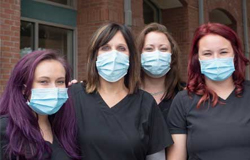The Positive Side of “Mask Breath”
When we wear our masks, there can be some health drawbacks, including breathing in a small amount of carbon dioxide which we are supposed to be exhaling. If you’re masking during a COVID infection, you may be increasing your viral load by re-breathing the very virus your body is trying to shed. The good news is that evaluating the smell of your “mask breath” up-close-and-personal can provide telltale signs of either health or danger.

Buda Dental, in Buda, Texas, on Friday, October 23, 2020. (Rodolfo GonzalezGonzoFotoz )
Your breath should be odorless. If it’s sweet & fruity, it can be a sign of diabetic ketoacidosis; if sour or stinky, it could indicate gingivitis (infected gums) or periodontitis (infected gums & bone). All smells deserve immediate attention.
Periodonitis
Let’s talk about “perio breath”. The mouth is home to more than 700 strains of bacteria, many of which are harmless or even helpful. But a handful of strains, the ones primarily at work in periodontal infections, are really dangerous. These bugs don’t just threaten our ability to maintain teeth, but also our systemic health. They seep into the gum tissue, circulate through the blood stream, and travel to organs far and wide. Periodontal pathogens are linked to 57 other diseases and can to contribute to heart attacks and strokes. Their presence is even considered a serious risk in your ability to survive a COVID infection.
Periodontitis is a very prevalent disease and often goes untreated. Half of us will have it by age 30, and 70% by age 70. Unfortunately, it doesn’t hurt – because if it did, people would seek treatment! The best advice is to choose a periodontally astute dental team, where your hygienist and dentist perform a perio examination at each preventative visit and keep you informed.
Dry Mouth
Dry mouth is another “fresh breath stealer”. Since over 400 of the most common drugs (prescription, over-the-counter, and recreational) decrease saliva flow, there has been a rapid rise in fungal (yeast) infections of the mouth. Nine fungal strains can be identified in saliva, although not all infections are easily remedied. If your mouth is parched and your breath is foul, it’s a sign of deteriorating health and you should speak with your dentist. Beyond bad breath and fungal overgrowth, dry mouth often results in rapid, active tooth decay and enamel erosion. Many people are unfortunately not aware of this risk and seek treatment after severe damage has already occurred.
To learn more, start with your dental team, and make sure they want to work collaboratively with your medical team. Together, they can uncover the root causes of your systemic issues, address them head-on, and hopefully help you de-medicate.
In conclusion, because we are wearing masks while out and about, we need to pay attention to what “mask breath” is saying! It may be a blessing in disguise and help you become healthier not only in your mouth, but your body as a whole.
